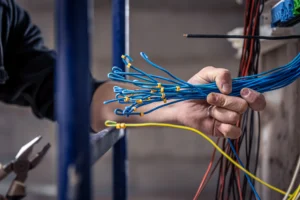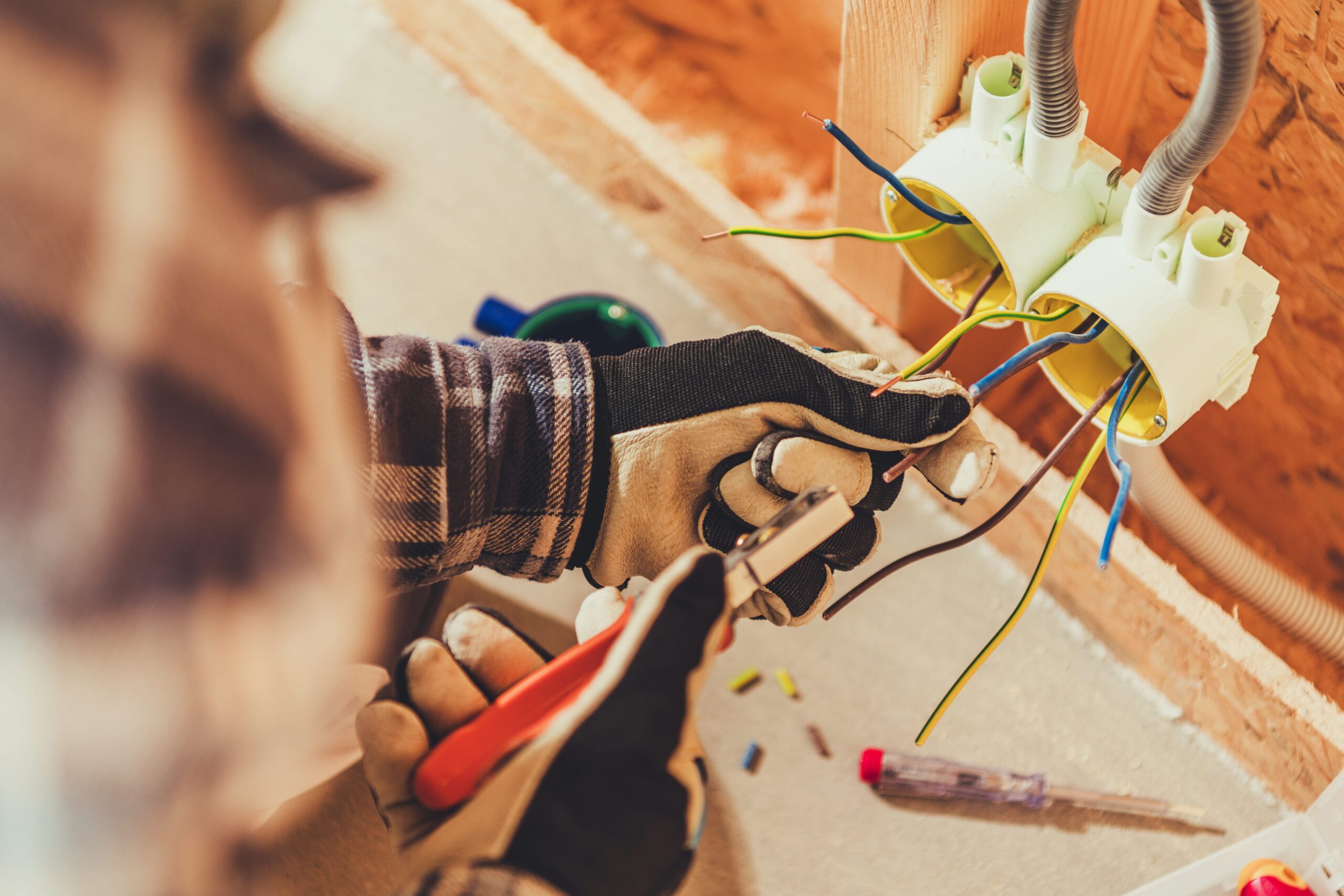Electrical costs for new home construction
Building a new home or renovating and looking for electrical costs for new home construction? Let’s explore how much it costs to wire a new house or rewire for renovations, and how to save on your project by either doing new construction wiring or renovating parts of the house, such as the kitchen, basement or Garage rewiring.
How much does it cost to wire a house
Cost of rewiring a house: The cost to wire a house per square foot provides a straightforward way to budget based on home size and additional wiring for features like home offices or high-voltage appliances.
Average Wiring Cost by Home Size
The electrical wiring installation cost to wire a house per square foot provides a straightforward way to budget based on home size and additional wiring for features like home offices or high-voltage appliances. The cost Per Square Foot for Wiring is $6 to $8 per square foot in the GTA. Please take a look at the table below:
| Home Size (Sq Ft) | Average Cost (CAD) |
|---|---|
| 1,000 sq ft | $4,000 – $7,000 |
| 2,200 sq ft | $7,000 – $13,000 |
| 2,500 sq ft | $9,000 – $16,000 |
| 3,000+ sq ft | $10,000 – $20,000+ |
For a 1,500 sq ft home electrical wiring quotes can range $9,000 to $12,000. For smaller homes around 1,000 square feet, the cost typically ranges from $4,000 to $7,000, and for Average-sized homes of about 2,200 square feet, the average electrical cost for a new home generally sees wiring costs between $7,000 and $13,000.
Electrical cost for new home construction For larger homes over 3,000 square feet, wiring expenses can range from $10,000 to $20,000 or more if additional circuits and specialized wiring are required to support the home’s electrical demands.
However, additional factors like specialized circuits, energy-efficient upgrades, and permit fees can slightly increase the overall cost. The complexity of the layout, such as open-concept designs or multi-story homes, can also impact pricing.
If you’re ready to proceed with your project and need a professional licensed electrician, kindly visit the construction and house wiring page for contracts in Ontario, Canada.

how much does it cost to rewire a house
How much does it cost to rewire a house in Ontario? When it comes to renovating or the cost to rewire a house, consider that rooms in a home have unique wiring requirements based on their specific appliance usage, safety needs, and the layout of each space to meet Electrical codes in Canada, which also demand certain standards for rooms with water sources or high energy consumption, which can increase cost to upgrade electrical in house. Here’s a detailed breakdown of how much it costs to rewire a house in Ontario by room:
| Room | Cost Range (CAD) | Details |
|---|---|---|
| Kitchen | $500 – $2,500 | Multiple circuits for appliances, GFCI outlets near water sources |
| Bathroom | $500 – $1,000 | GFCI outlets for safety, lighting, and exhaust fan |
| Living Room | $800 – $1,500 | Lighting, entertainment system outlets, and possible dimmers |
| Basement | $2,000 – $7,000 | Lighting, HVAC, outlets, and additional circuits for finished spaces |
| Garage / Outdoor Structures | $1,000 – $5,000 | Underground wiring, GFCI outlets, lighting, EV charger compatibility |
Cost of wiring a Kitchen
Kitchens require multiple circuits to handle high-powered appliances like refrigerators, ovens, and dishwashers, which all need dedicated outlets to avoid overloading the circuits. Additionally, GFCI (Ground Fault Circuit Interrupter) outlets are required by code near water sources, providing extra safety by automatically cutting off power when moisture is detected.
Wiring a kitchen typically costs between $500 and $2,500. The layout of appliances, lighting needs, and any additional features like under-cabinet lighting or island outlets can further influence kitchen wiring costs.
How much does it cost to wire a basement
For bathrooms, wiring costs range from $500 to $1,000. Bathrooms have strict safety standards due to the presence of water, which requires the use of GFCI outlets to prevent electrical shock near sinks and showers.
Bathrooms also need wiring for lighting, exhaust fans, and sometimes heated towel racks or vanity lighting, which can add to the overall cost.
The presence of high-wattage devices, like hairdryers or electric heaters, may also require dedicated circuits, depending on usage frequency.
Cost for wiring the Living Room
Living room wiring costs can vary from $800 to $1,500. This cost largely depends on the lighting setup, and any entertainment systems, such as TVs, sound systems, or gaming consoles, often require multiple outlets and may even need specialized wiring for home theatre equipment.
Additional costs may arise if recessed lighting, dimmers, or smart home features are included, as these require more complex wiring. Outlets in living rooms are generally spaced according to code to allow convenient access, minimizing the use of extension cords.
Basement electrical wiring cost:
How much to wire a basement? Wiring a basement is generally more complex, with costs between $2,000 and $7,000 widely based on how the basement is used. Unfinished basements used primarily for storage may only require basic lighting and a few outlets, reducing wiring costs.
For example, a basement converted into a living space with lighting, outlets, HVAC connections, and possibly a bathroom will calculate a higher amount.
The basement includes specific setups, such as a home gym, office, or kitchenette; additional circuits may be necessary to support these areas.
Wiring cost for Garage, Outdoor Structures:
Wiring for garages and outdoor structures, such as detached garages, workshops, or sheds, typically costs between $1,000 and $5,000. Detached structures require wiring through underground conduits, which adds to labour and material costs, especially if the distance from the main house is significant.
Garages may need wiring for door openers, lighting, and electric vehicle (EV) charging stations, which require dedicated 240V outlets and circuits.
Outdoor wiring may also include weather-resistant fixtures, GFCI outlets, and motion-activated or security lighting, all of which increase costs for safety and compliance with outdoor wiring standards.

Factors Adding To Construction Wiring Quotations
Several factors directly impact new home wiring costs, from material choice to location and regulatory requirements.
- Home Size and Layout: Larger homes or complex layouts require more wiring and labour.
- Panel Amperage Needs: For example, a 200-amp panel installation typically costs CAD $1,300–$3,000, suitable for high-energy needs or electric vehicle chargers.
- Underground vs. Overhead Wiring: Underground installation can be more expensive due to trenching requirements.
- Local Labour Rates: Canadian electrician labour costs range from 50 to $150 per hour, varying by province and expertise level.
- Permits and Inspections: Electrical work requires permits, typically costing CAD 100–$400, plus inspections for code compliance.
Common Upgrades Pot Lights, 200-amp Panels, and Outlets
- Pot Lights: Modern pot lights can cost CAD 50–$150 per fixture. While pricier than traditional fixtures, they offer aesthetic and functional advantages.
- 200-Amp Panel Upgrade: Often required for high-demand homes, costing around CAD 1,300–$3,000.
- GFCI and AFCI Outlets: Essential in bathrooms, kitchens, and wet areas, costing between CAD $125 and $500 per outlet, depending on the type and amperage.
Types of Wiring and Material Costs
Different wiring materials affect costs based on usage and location. Here are common materials and their respective prices per linear foot:
- THHN Wire: $0.15–$1.50, used for high-temperature areas.
- NM Cable: $0.50–$3.50, popular in residential wiring for dry locations.
- UF Cable: $0.60–$2, suited for underground or moist environments.
Choosing the right material ensures both safety and durability, especially for specific areas like basements or outdoor structures.
| Material Type | Cost per Linear Foot (CAD) | Usage |
|---|---|---|
| THHN Wire | $0.15 – $1.50 | High-temperature areas |
| NM Cable | $0.50 – $3.50 | Dry locations in residential buildings |
| UF Cable | $0.60 – $2.00 | Outdoor, underground, and moist environments |
Cost-Saving Tips for Construction Wiring Projects
Here are several strategies to save on construction wiring costs without compromising quality or safety:
- Get Multiple Quotes: Compare prices from at least three licensed electricians.
- Bundle Electrical Work: If you need an electrical panel upgrade, combining it with the construction wiring can save on labour.
- DIY Basic Tasks: While major wiring should be left to professionals, small tasks like installing light plates can be DIY if allowed.
- Check for Energy Efficiency Rebates: Some provinces offer rebates for energy-efficient upgrades, which can help offset wiring costs.

Considerations for Older Homes vs. New Construction
While new home wiring costs are generally more straightforward, rewiring older homes presents additional challenges, including opening walls and removing old wiring, which can cost between $5 and $17 per square foot to upgrade wiring in house.
Older homes may also need to upgrade wiring in house and replace knob and tube wiring, or, more often in downtown Toronto, need to replace aluminum wiring :
- Updated Panels for Old House: Upgrading from a 100-amp to a 200-amp panel can range from $1,300 to $3,000.
- Additional Grounding or Surge Protection: Essential for safety in older structures, adding CAD $100–$500.
Safety and Compliance in Construction Wiring
Ensuring safety requires compliance with electrical code requirements for new homes in Canada. The Electrical Safety Authority (ESA) mandates that licensed electricians handle all wiring, including necessary permits and inspections. Inspection requirements confirm that all work meets current safety standards for residential wiring to prevent electrical hazards.
Financing Options for Home Wiring Projects
If construction wiring costs exceed your immediate budget, several financing options can help:
- Home Equity Loans: These are Suitable for major upgrades, using home equity as collateral.
- Personal Loans: These are Flexible and ideal for smaller projects.
- Contractor Payment Plans: Many electricians offer in-house financing with payment plans.
- Government Rebates: Look into energy-efficiency incentives for wiring upgrades in your province.
FAQs on Construction Wiring Cost
- How much does it cost to rewire a house in Canada?
- Rewiring can range from $6,000 to $13,000, with older homes potentially costing more.
- What factors affect the cost of wiring a new house?
- Size, layout, panel needs, material choice, and local labour rates are major factors.
- How long does it take to wire a home?
- For new construction, it usually takes 3–5 days, while rewiring can take longer, especially in older homes.
- Do I need a permit to wire a house in Canada?
- Yes, permits and inspections are typically required for compliance with ESA standards.
- Can I rewire my house without opening the walls?
- In some cases, electricians can “fish” wires through walls, though full rewiring may need wall access.
Conclusion: Planning for Your Construction Wiring Costs
Construction wiring costs are a necessary investment in any new home project, ensuring safety, energy efficiency, and code compliance. By understanding the factors that affect costs, from Canadian electrician labour costs to panel upgrades and permits, you can budget effectively and prioritize essential upgrades.
For a more accurate estimate, consult a licensed electrician who can provide a detailed quote based on your home’s specific needs. A well-planned wiring project not only secures your home’s electrical future but also adds value and convenience for years to come.



One Response
Two story 3 bedroom company home in glace bay ball park for material and labor